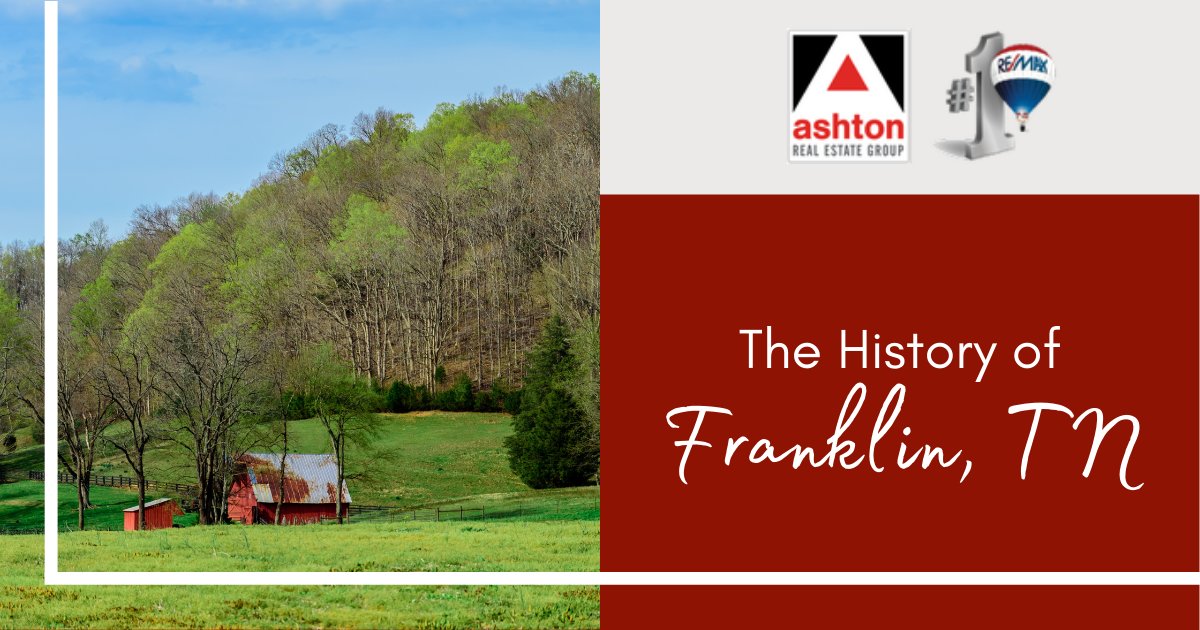History of Franklin, TN: Franklin's Interesting Local History
Posted by Gary Ashton on Thursday, April 29th, 2021 at 12:02pm.

Located about 20 miles south of Nashville, Franklin, Tennessee, is the county seat of Williamson County and a fascinating destination for history buffs. Seeing much of its initial growth in the years before the Civil War, Franklin was also a site of decisive battles. The city has gone to great lengths to preserve its history and also tell a fuller version of the area's past. Read on to get a taste of Franklin's history.
The Founding of Franklin
The area that would later become Franklin, Tennessee, was home to around seven Native American tribes during the 16th and 17th centuries. However, by the 18th century, only the Cherokee would permanently reside in the area.
The Franklin area's first European settler, Ewen Cameron emigrated from Scotland before traveling to Tennessee. He built a log cabin in the area in 1768 and lived in it for the rest of his life. The site of his original settlement is commemorated with a historic marker. Several of Cameron's descendants still live in the city.
Soon after, other settlers migrated into the area, including a number from neighboring Kentucky. The city of Franklin was founded by Abram Maury, Jr., and incorporated in 1799. Maury, who had edited newspapers in St. Louis, Missouri, and Nashville, Tennessee, returned to Franklin after his marriage to Mary Eliza Tennessee Clairborne. His wife's family was politically connected, and Maury later served in the Tennessee House of Representatives.
The city was named for Benjamin Franklin on account of Franklin's friendship with another locally important figure, Dr. Hugh Williamson, a member of the Continental Congress and the person for whom Williamson County was named. Dr. Williamson is best known as one of the signatories of the U.S. Constitution.
In the years before the Civil War, Williamson County was one of the wealthiest in Tennessee; Franklin was the center of the state's plantation economy. Hemp and tobacco became popular trade crops. The area was also a popular site for raising purebred livestock. Reports from the era also include the growing of commodities such as cotton, corn, sweet potatoes, and more.
Franklin in the 19th Century
Franklin soon grew to be a prosperous agricultural area. In the years before the Civil War, many plantations grew and shipped goods throughout the region. Williamson County was among the wealthiest counties in Tennessee and was also considered politically important. Two presidents made visits to Franklin. There were also three Secretaries of War born in the area.
Things would change for well over a century, however, starting with the dawn of the Civil War. The Battle of Franklin, fought on November 30, 1864, was among the most devastating battles. As a result, 50 nearby homes in the area were converted to field hospitals. According to Franklin's official city site, it would take 120 years for the city's economy to regain pre-war levels.
Franklin: From Then to the Present
In the early 20th century, the once bustling city saw its population size contract. Individuals who previously worked in agriculture went north to industrial cities, leading to a population that fell year by year between 1910 and 1940.
There were attempts to bring manufacturing to Franklin, but few in the early 20th century were long-lasting. For instance, Dortch Stove Works opened a factory in Franklin, which was later converted to a Magic Chef factory, producing gas and electric ranges. However, when the industry was restructured, the factory was shut down. After having a short life as a bedding manufacturer, and spending some time vacant, the property was revitalized and now houses both retail and office tenants. The property was added to the National Register of Historic Places in 1997.
While Franklin had many starts and stops, its fortunes truly began to change as Nashville rapidly grew. Nearby Franklin became an attractive residential and business suburb, which spurred new economic growth in the region. The population, which had dropped to 12,407 in 1980, has grown five-fold since then. At present, Franklin is the seventh-largest city in Tennessee and ranked the eighth-fastest growing city in the nation.
Franklin's proximity to Nashville has also influenced musical contributions from the community. Notable musicians from Franklin include Miley Cyrus, Duane Eddy, Robert Knight, and members of the rock band Paramore. Franklin has been host to the Pilgrimage Music and Cultural Festival since 2015, and the festival attracts many national acts.
Starting in the late 20th century, Franklin began to attract many new businesses. The area is now home to major healthcare-related companies, gas utilities, recording label Provident Music Group, and World Christian Broadcasting.
As a place where progress and history live side by side, Franklin has endeavored to ensure that landmarks are preserved and stories are told. Many features from Franklin's history survive today, and work in the historic preservation movement has created five separate historic districts. Throughout the city, there are ample places for people to explore American history and gain a better understanding of this region's place in it.
Does Franklin sound like the perfect place to live? Contact The Ashton Real Estate Group of RE/MAX Advantage with Nashville's MLS at (615) 603-3602 to get in touch with Franklin real estate agents who can help you find the ideal Franklin home.

Gary Ashton
The Ashton Real Estate Group of RE/MAX Advantage
The #1 RE/MAX team in the World!
